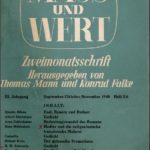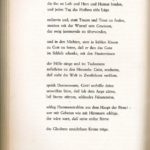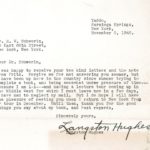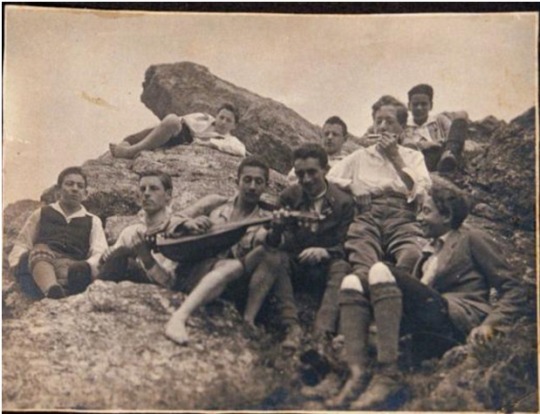Hans Wolfgang Schwerin. Click on images above for enlarged views. Pictures of the poet; a copy of his published volume of poetry (Irdische Heimat); a poem from this volume; the poet’s dedication of the book to the Leo Baeck Institute; a binder that contains his personal notes/drafts; a typewritten poem from that binder; the cover of the Mass und Werte issue in which his work appeared; a copy of his poem in the journal; a letter that he received from Langston Hughes in November of 1942 (complete with Hughes’s signature).
Hans Wolfgang Schwerin was born in Breslau in 1906. His mother was a relation of Paul Ehrlich. He earned a law degree from Universität Breslau in 1937 and immigrated to the United States in the following decade with his parents and younger sibling, Günther. Schwerin’s vocation was writing; throughout his life, Hans Schwerin maintained relationships with literary figures and wrote poetry and works for live theatre. In 1939, a volume of his poetry, Irdische Heimat, was published under the pen name Wolfgang H. Syland. A theatre work, Vorstellung in drei Akten, was published in 1982.
We found some of Schwerin’s personal papers in a collection housed here at the Center. Angela Lawrence, a Processing Archivist, notes:
I am processing a collection in which a family member (Hans Wolfgang Schwerin) had a volume of poetry published. The Leo Baeck Institute library has a couple of copies of this volume. [Syland, Wolfgang H. Irdische Heimat: Gedichte. Bern: A. Francke A.G., 1939.]
One of the poems from that volume, “Der Fluch”, was also printed in an literary journal and in a couple of newspapers: [Schwerin, H.W. “Der Fluch.” Mass und Wert 3, no. 5/6 (September – November 1940): 636.]
The collection also contains a couple of notebooks of poetry, sketches and drafts by Hans. All of these works are in German.
Note: Mass und Werte, the journal pictured and mentioned above, was published in 1940 and edited by Thomas Mann (who is perhaps best known in the U.S. for his novel Death in Venice). “Mass und Wert” means “Measure and Value.” It was a publication for German authors in exile, the “Free German Press.”
Submitted by Angela Lawrence, Center for Jewish History, and Michael Simonson, Leo Baeck Institute.












